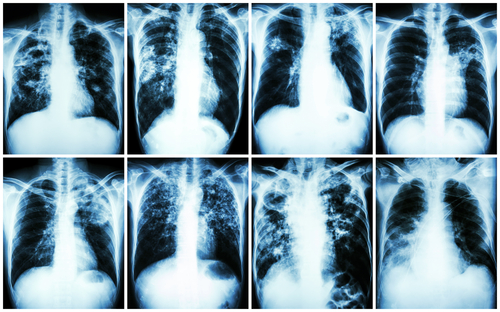OFEV Slows Progression of Fibrosis, Lung Imaging in Phase 3b Trial Shows

Pulmonary fibrosis treatment OFEV (nintedanib) slows the progression of lung scarring, according to high-resolution scans used in a Phase 3b clinical trial.
Computed tomography imaging demonstrated for the first time that six months of Ofev could reduce the progression of patients’ lung fibrosis lesions, compared with a placebo. Two previous Phase 3 trials have also shown the therapy’s effectiveness.
Researchers presented the Phase 3b trial results at the Pulmonary Fibrosis Foundation Summit 2017 in Nashville, Nov. 9-11. It was titled “Effect of nintedanib on disease progression: results from a Phase IIIb trial in patients with idiopathic pulmonary fibrosis (IPF).”
“With the aid of high-resolution CT scans, we have observed a reduction in the progression of lung fibrosis with Ofev versus placebo,” Dr. Lisa Lancaster, clinical director of the Interstitial Lung Disease Program at Vanderbilt University Medical Center, said in a press release.
“These encouraging results demonstrate that through an imaging scan we identified differential responses in fibrotic changes between groups that will help doctors make informed treatment decisions,” added Lancaster, the lead investigator of the study.
Developed by Boehringer Ingelheim, Ofev is one of the first drugs that the U.S. Food and Drug Administration and European Union have approved as a treatment for idiopathic pulmonary fibrosis, or IPF.
Ofev inhibits an enzyme involved in the promotion of fibrosis signaling pathways. Those pathways trigger the accumulation of fibroblasts — lung cells that promote scarring — and the production of collagen, a protein associated with fibrosis.
The Phase 2 TOMORROW (NCT00514683) trial and the Phase 3 INPULSIS studies (NCT01335464 and NCT01335477) showed that 150 mg of Ofev twice a day for more than 52 weeks could improve IPF patients’ lung function, compared with a placebo.
Results of the long-term INPULSIS-ON extension trial (NCT01619085) also have demonstrated Ofev’s potential to slow lung function decline in IPF.
The Phase 3b trial (NCT01979952) investigators used high-resolution CT scans to evaluate Ofev’s ability to slow fibrosis. The study included 113 patients with IPF who received either 150 mg of Ofev or a placebo twice a day.
After six months, the average CT lung fibrosis score for the Ofev-treated patients was 11.4 percent, versus 14.6 percent for the placebo-treated patients. A lower score indicates less fibrosis progression.
Ofev-treated patients also experienced less lung function decline than the placebo patients, researchers said. The team used a lung function measure known as forced vital capacity — the amount of air that a person can forced exhale after taking the deepest breath possible.
“This study reaffirms the beneficial effect of Ofev for reducing lung function decline and slowing disease progression, and is the first to suggest that there may be a differential effect of Ofev treatment versus placebo in lung fibrosis change,” said Dr. Thomas Leonard, executive director of Clinical Development and Medical Affairs, Specialty Care, at Boehringer Ingelheim.
“We look forward to presenting additional findings from this study at major medical congresses next year and confirmation of these results in future studies,” Leonard added.






